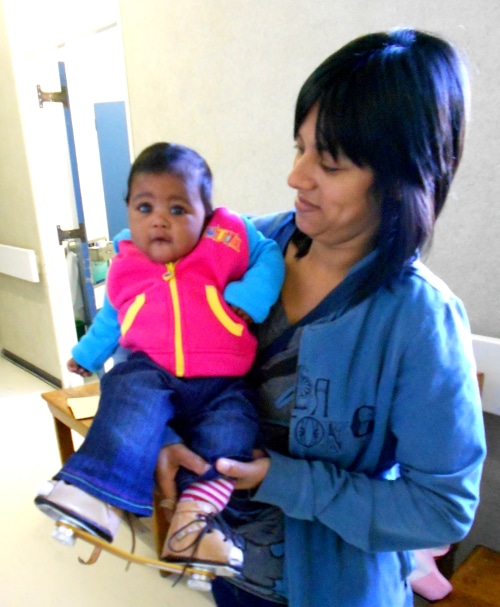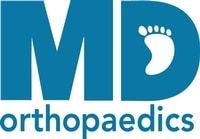FIND A CLINIC
The network of specialist South African clubfoot clinics providing clubfoot care.
Partner Clinics
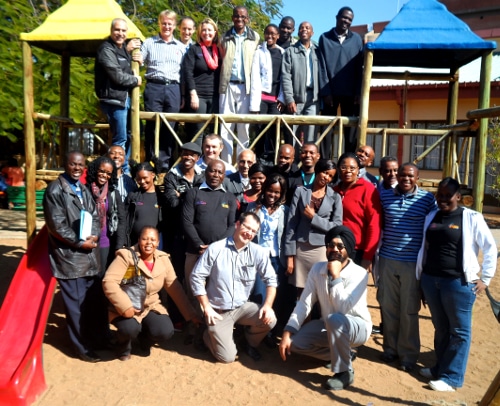
Botswana has a population of just over 2 million, 33% of whom are under 14. The country is divided into nine districts. The biggest cities are Gaborone and Francistown, with about 200 000 and 100 000 inhabitants respectively. Based on an incidence of 1/500 live births and a birth rate of 22.02/1000 of the population, it is estimated that over 90 babies are born with clubfoot per year in Botswana. [1]
Steps founder Karen Moss first became involved in clubfoot treatment in Botswana in 2009, after being contacted by Gaborone mother Tshepang Seisa for help with her son’s case. Tshepang took her son for Ponseti treatment in Johannesburg. In 2011 Karen raised funds and arranged treatment in Johannesburg for Erto, another child from Botswana, who had untreated clubfoot.
Karen and Tshepang discussed the need to introduce the Ponseti method to Botswana so that all children could access treatment in their own country. Tshepang identified a delegate to attend the May 2012 SAPOS Ponseti Instructional Course in Cape Town. After training, they had several meetings with government to motivate for the introduction of Ponseti.
In November 2012, Karen attended a meeting organised by Tshepang with the head of Paediatric Orthopaedics at Princess Marina Hospital, Dr Yash Gureja.
Two further meetings were held at the Ministry of Health (MoH) in November 2012 and January 2013 and Steps was requested by the Botswana government to help establish a National Clubfoot Programme. Steps organised the first Botswana Ponseti training in June 2013 at Princess Marina Hospital, Gaborone. Three South African Ponseti faculty trainers trained twenty-three delegates attended from 12 hospitals/clinics, and seven towns/districts.
In July 2013, the Ponseti clubfoot clinic in Princess Marina Hospital started. By October 2013, the Princess Marina Hospital clubfoot clinic had already treated 34 patients. In July 2013, a week after the training, the first Ponseti clubfoot clinic in Princess Marina Hospital started, supported by Steps. By October 2013, the Princess Marina Hospital clubfoot clinic had already treated 34 patients.
In November 2013 the STEPS Botswana Trust was registered as a non-profit trust in Gaborone. In November 2014 STEPS organised the 2nd Botswana Ponseti training at Mahalapye Hospital with support from the Botswana Ministry of Health, with South African and local faculty trainers. A Ponseti trained Botswana team set up a new clubfoot clinic at Mahalapye Hospital with support from Steps, Steps Botswana Trust, the PMH team and the Botswana Ministry of Health.
In May 2015, Steps Botswana signed a Memorandum of Understanding with the Botswana Ministry of Health and Social Services to collaborate on the development of a national clubfoot programme and to raise awareness in the community that clubfoot can be treated.
The 3rd Botswana Ponseti training was held in Maun in July 2015 at Letsholathebe II Memorial Hospital in partnership with Thuso Rehabilitation Centre. As a result of the training, a new clubfoot clinic was established at Letsholathebe Hospital with local support resources from Thuso Rehabilitation Centre. A follow up training was held in Maun in April 2016 to educate nurses and community workers on recognising clubfoot, as there are a high number of neglected cases in outlying areas due to late referral.
Steps’ MOU with the Botswana Ministry of Health expired in May 2017 and the Botswana government took over management of the national clubfoot programme. Over 290 patients were treated in the programme from July 2013 to June 2017. Steps provided training workshops and materials, clubfoot braces, parent education, data capture, and supported outreach visits and clubfoot awareness events.
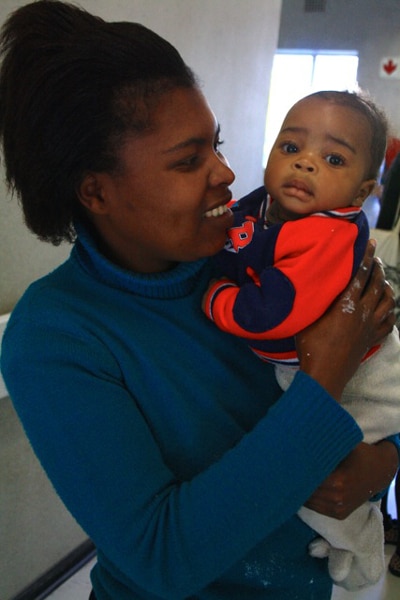
1. Mkandawire N.C., Kaunda E, Incidence and Patterns of Congenital Talipes Equinovarus (Clubfoot) Deformity At Queen Elizabeth Central Hospital, Malawi

Namibia has 2 million inhabitants, 36.4% of which are under 14 years of age. The birth rate is 21.11/1000 of the population. Based on an incidence of 1/500 live births with clubfoot in southern Africa, it is estimated that around 90 babies are born with clubfoot per year in Namibia.
Steps South Africa after a request from Windhoek Hospital, provided assistance for the launch of the new Ponseti clubfoot clinic at WCH in April 2013, run by Dr Ernest Kombo, who had attended the Steps Botswana Ponseti training in June 2013. The clinic was overseen by Paediatric Orthopaedic consultant Dr Jacques Jonck. The WCH clinic developed well due to good leadership, hospital support and the supply of braces and data capture training from Steps.
Steps, in partnership with WCH and the Namibian Ministry of Health, organised the first Namibia Ponseti training in November 2013, with 28 delegates from five regions: Khomas, Hardap, Oshikito, Kavango, and Oshana. South African and Tanzanian Ponseti faculty trainers gave lectures and practical training in the Ponseti method.
A Ponseti refresher training was held at Windhoek Hospital in July 2015, and trainings in Oshakati and Rundu in August and September 2015. Steps supported the training with curriculum and training models.
In August and September 2015, two more Ponseti clubfoot clinics were established in Oshakati and Rundu, so that patients from Northern Namibia could have treatment closer to where they live.
In June 2016, three years after Steps introduced the Ponseti method to Namibia, the Namibian Permanent Secretary for Health thanked us for our contribution to the successful of treatment clubfoot patients by introducing the Ponseti method, supporting the opening of clinics with data capture and parent education, and Ponseti training.
The Ministry of Health and Social Services manages the Namibian Clubfoot Programme as a sustainable programme within the public health system.
1. Population Division of the Department of Economic and Social Affairs of the United Nations Secretariat, World Population Prospects: The 2010 Revision
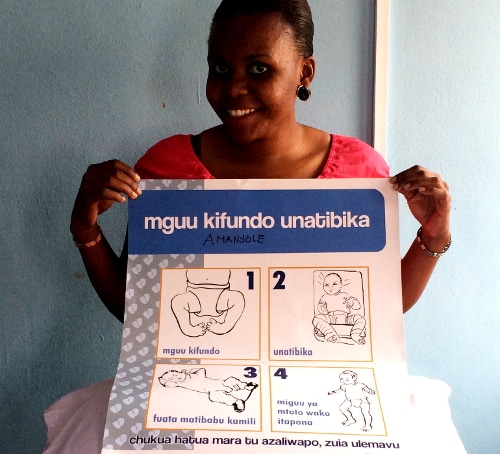
In 2013, Steps South Africa worked with miraclefeet and Dr Isidor Ngayomela of the Bugando Clubfoot Programme to provide administrative support, monitoring and evaluation for six clubfoot clinics around Mwanza (Lake region).
Steps helped to plan a national network of providers, the establishment of a central organisation and the collaboration between all regions of Tanzania. Steps chaired the first clubfoot national network meeting in Dar es Salaam in February 2014.
Steps supports Tanzanian clubfoot care with advocacy through social media, parent education materials, and the sourcing of casting and other materials for clinics.
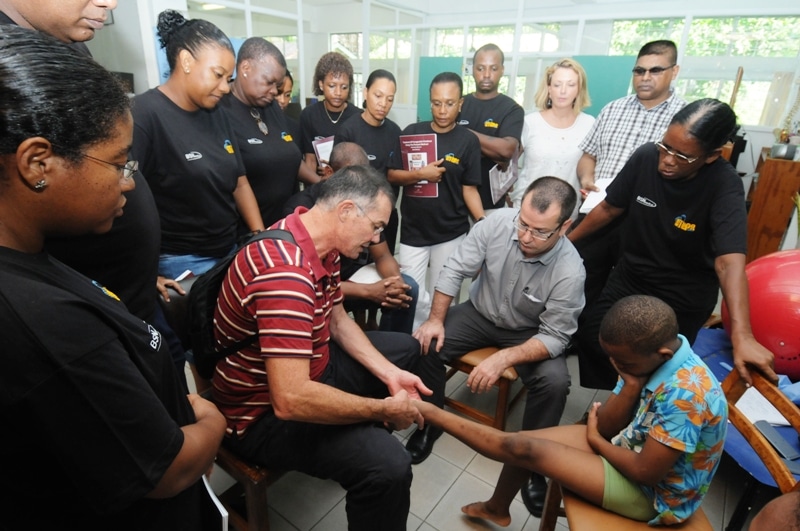
Based on the Seychelles birth rates and a population of about 88 000 – 90 000, an estimated three children are born annually with clubfoot. However, there were many more older neglected cases, relapses after surgery, and disabled people living in this area because of failed treatment.
Seychelles is divided into 25 administrative regions that comprise all of the inner islands. There are hospitals on the islands of Mahe, Praslin, and La Digue. The Seychelles Hospital is the national referral hospital, and is located in Victoria, the capital of the Seychelles, on the island of Mahe.
Ninety percent of Seychellois live on the island of Mahe, and most of the rest live on Praslin and La Digue, with the remaining population living on smaller islands that are sparsely populated.
In July 2013, Steps South Africa met with the Director of Rehabilitation Services of the Seychelles Ministry of Health (MoH) to discuss starting a Ponseti clubfoot clinic programme.
Steps and the MoH collaborated to arrange a Ponseti training workshop in Mahe in April 2014. 16 delegates attended this training, which was the first held in the Indian Ocean Islands.
Until the training was held, clubfoot patients were receiving serial casting, followed by surgery by visiting surgeons. Many others were considered failed cases, and lived with disability. This training gives the people of the Seychelles the means to manage an effective clubfoot treatment programme. The Seycyelles Ministry of Health runs the Ponseti clinic through the Physiotherapy department based at the Mahe hospital, with assistance from visiting surgeons from Reunion island. Steps provided educational materials and clubfoot braces to establish the programme and improve sustainability.
The media covered the Ponseti training on TV news, and in Seychelles Nation.
